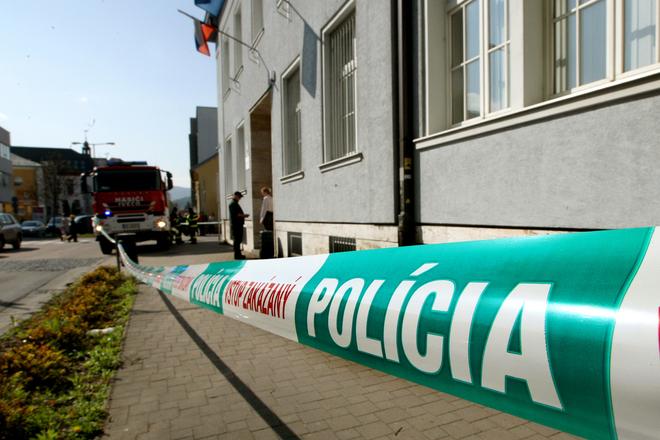Children in Slovakia will resume school on Thursday following a public holiday on May 8, however, it will be a different kind of return. Police officers will keep an eye on schools across the country after numerous schools received bomb threats on Tuesday.
The Interior Ministry announced on Wednesday that 2,050 police officers have been assigned to patrol schools.
“Each school will have its own police officer,” Deputy Interior Minister Lucia Kurilovská said at the Wednesday press conference.
On Tuesday, hundreds of schools, banks and electronics shops in Slovakia received bomb threats by e-mail and by phone.
Bomb threats reported by schools on May 7
Bratislava Region: 110
Trenčín Region: 148
Nitra Region: 232
Banská Bystrica Region: 94
Žilina Region: 228
Trnava Region: 119
Prešov Region: 176
Košice Region: 216
Source: Slovak police
As per the police report, a total of 1,323 bomb threats were reported in schools, 110 in banks (VÚB) and 40 in electronics shops (Nay) by 15:00 on Tuesday. In total, the police recorded 1,544 bomb threats.
“The extent of bomb threats is staggering,” the police underscored.
The latest threats were reported on Thursday, May 9, when two secondary schools in Banská Bystrica, central Slovakia, received these threats.
The anonymous email mentioning the bomb threat, which is written in Slovak, is reputed to commend Islam. Although the email is in Slovak, it is believed to have been translated into Slovak from another language due to the structure of sentences.
“We’re in your country now,” reads the e-mail, as quoted by TV Markíza.
The National Crime Agency (NAKA) has taken over the case and begun to prosecute an unknown perpetrator - for now - for terrorism. A person who is convicted of terrorism can spend 20-25 years in prison or receive a life sentence.
The police have also asked foreign partners to help.
“It is depraved to threaten schools with bombs, even for fun,” said Education Minister Tomáš Drucker.
Russian email addresses
More than 120 schools in the Bratislava Region received a similar email last Friday, May 3. The email from last week mentioned Allah and Sharia law, but also mentioned explosives in lorries. Again, the email was clearly translated into Slovak.
Both emails were sent from Russian email addresses, given that they ended with “.ru.” The May 3 email was sent from seyfulllah@mail.ru, while the May 7 email was sent from arealll@list.ru, writes the Sme daily. Both domains are offered by the VK company from Russia. Its CEO is Vladimir Kiriyenko, the son of Putinist and Kremlin official Sergey Kiriyenko.
“Despite the fact that the number of such crimes has been increasing over the past period, the police do not underestimate any report and pay sufficient attention to it,” the Interior Ministry said.
However, PM Robert Fico did not convene the Security Council. He deems the measures in place to be sufficient. Previously, he abused it for his own gain. For example, during the 2024 presidential election, the Council was convened to discuss a detained foreigner, which Interior Minister Matúš Šutaj Eštok described as a terrorist. It was discovered that the individual in question was not a threat, and Fico and his government opted to exploit fear to aid their presidential candidate, Peter Pellegrini, in winning the election.
Pavol Gašpar, head of the top Slovak spy agency (SIS), said it is impossible to say that foreign intelligence agencies were behind the threats.
In an interview with the Sme daily several days after the threats arrived, ethical hacker Tomáš Zaťko said that the most important information that the Slovak police do not know is whether and what technical methods the perpetrator used to hide where and from which country they organised the whole thing.
“The essential information is the IP address from which the person accessed the e-mail account from which the threats came to the schools. This key piece of information about what IP address the activity originated from is currently on a Russian server,” said Zaťko.
The expert noted that the perpetrator could have used the so-called anonymizer to make their activity on the Internat untraceable.
“In this case, tracing the real source would be very difficult, one could say practically impossible,” Zaťko said.
Fake bomb threats abroad
Last year, similar fake bomb threat incidents were also reported in Lithuania and Estonia. In 2019, around 700 Polish schools were targeted by false bomb threats during the exam period. RMF 24, a Polish radio station, reported in 2020 that the perpetrators behind the entire 2019 operation were people logged in to accounts used by the GRU - Russian military intelligence.
The Slovak police also believe that the email threats from Tuesday were not real threats.
“Our analysis of the evidence obtained so far indicates that it was most likely a cyber attack rather than a real threat,” deputy police chief Rastislav Polakovič said on Wednesday.
Regarding the threats received over the phone, the police have detained two men. One person, 25, made a bomb threat to a court in Bratislava, and another person, 14, called in a bomb threat to a school in Brezno, central Slovakia.



 Numerous Slovak schools got bomb threats on Tuesday. (source: TASR)
Numerous Slovak schools got bomb threats on Tuesday. (source: TASR)